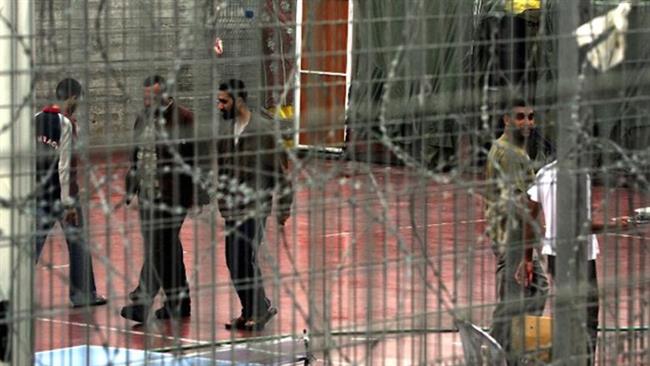Alwaght- Palestinian Committee of Prisoners Affairs says the Israeli regime met 80 percent of hunger striker’s demands.
After the strike ended in the early hours on Saturday following 20 hours of negotiations, Palestinian officials did not immediately reveal details regarding the achievements of the hunger strike.
According to Ma'an news more details emerged on Sunday regarding the outcome of negotiations between hunger strikers and the Israel regime Prison Service (IPS).
On Sunday, head of the Palestinian Committee of Prisoners' Affairs Issa Qaraqe said in a statement that 80 percent of the hunger strikers' demands were met according to the agreement reached after negotiations between IPS and representatives of hunger strikers led by imprisoned Fatah official Marwan Barghouthi. However an IPS spokesperson denied reports that the Tel Aviv regime met 80% of the demands by striking prisoners.
Qaraqe described the outcome of the hunger strike as "a fundamental transformation in the terms of the prisoners' living conditions."
According to committee lawyer Karim Ajweh, who met with hunger-striking prisoner Nasser Abu Hmeid -- a member of the team who negotiated the agreement at Ashkelon prison Friday night -- the major terms agreed upon were listed as follows:
1. Expanding access to public telephones in order to communicate with family members.
2. An agreement was reached on a number of issues related to family visitations, including lifting the security ban imposed by Israel on hundreds of prisoners' family members, including 140 children.
3. The Israelis agreed “in principle” to allow Palestinians the besieged Gaza Strip to visit their imprisoned relatives once every month instead of once every two months.
4. An agreement was reached “in principle” to a number of improvements regarding the conditions of family visits, such as allowing the entry of clothes and candy.
5. New criteria will be introduced to allow visits from second degree relatives -- such as nephews and nieces.
6 .The Israelis officially agreed to resume a second family visit every month, as was agreed by the Palestinian Authority.
7. An agreement was reached to return ill prisoners to the newly refurbished Ramla prison hospital.
8. An agreement was reached to gather all female Palestinian prisoners in HaSharon prison. Arrangements will also be made for visits from their husbands and children.
9. An agreement was reached to improve the living conditions for imprisoned minors and their transportation from prisons to courts.
10. The majority of unresolved issues regarding improving living conditions at Nafha prison were resolved.
11 . An agreement was reached to transfer ill prisoners currently held in the Ramla prison clinic to the newly refurbished section at Ramla noted above, under adequate and humanitarian living conditions.
12 . Prisoners in transit will also receive meals and be allowed use the toilet during transfers.
13 . An agreement was reached to have an appropriate kitchen area established in every prison ward, to be equipped with cooking equipment.
14 . Prisoners will be allowed to take photos with their spouses during visits.
15 .The system of the prison’s commissary will be amended “substantially,” in terms of the prices and quality of goods.
16 . Modern sports equipment will be installed in prison recreation yards.
17 . The issue of overcrowding, as well as issues related to temperatures, ventilation, and cooling will be resolved.
18 . Ambulances equipped as intensive care units, to transfer prisoners in urgent health emergencies, will be stationed outside Ktziot prison, Ramon prison, and Nafha prison, due to their remote locations away from hospitals.
19. According to the agreement, prisoners should be transferred to prisons as close as possible to their families’ places of residence.
More than 1,700 Palestinian prisoners had joined the protest action dubbed the Freedom and Dignity Strike since April 17, which was initially called by Imprisoned Palestinian parliamentarian Marwan Barghouti. The strikers were demanding basic rights, such as an end to the policies of administrative detention, solitary confinement and deliberate medical negligence.



























